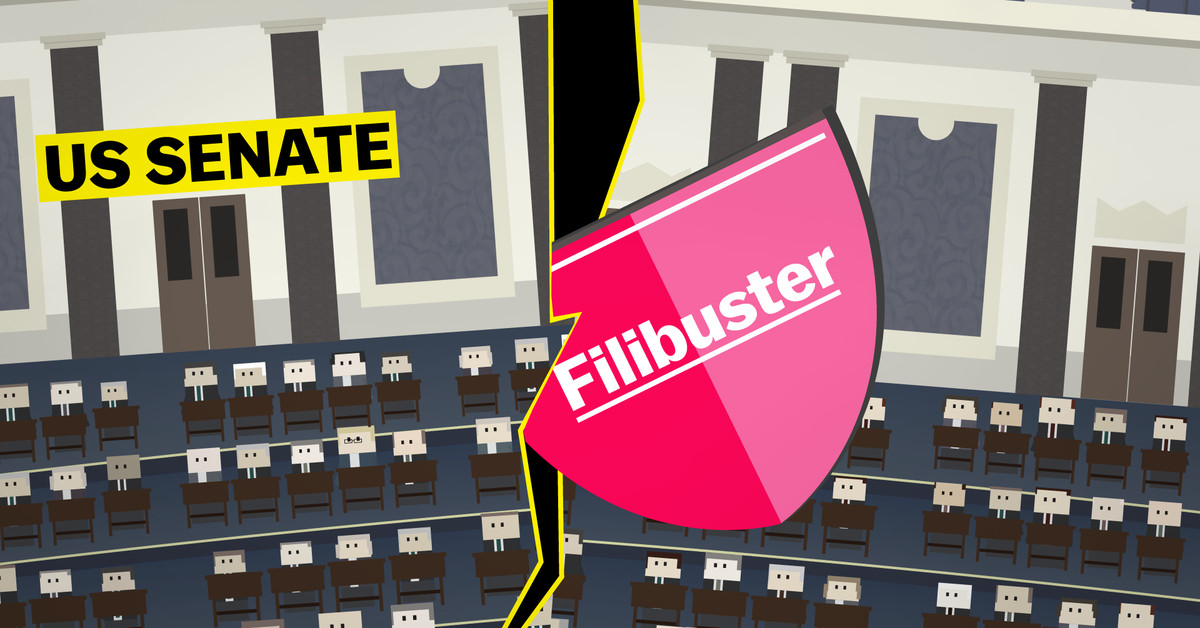
The Filibuster Becomes a Weapon of Political Polarization
Although used in the Korean National Assembly to mean "unlimited debate," filibusters used in the U.S. Senate refer to any kind of obstruction of the proceedings that hinders voting on an issue. According to procedural rules, all senators have the right to speak at the podium of the plenary session without reference to any particular subject matter or time constraints. They may present counterarguments, but they can also introduce conversations exchanged with voters or read the Bible or a cookbook just to kill time. In 1957, South Carolina lawmaker Strom Thurmond recorded the longest session at 24 hours and 18 minutes. Senators may also propose meaningless amendments that are difficult for a majority to approve. Sometimes during sessions, they will ask for a quorum check or a suspension, and there may also be calls to suspend congressional sessions or dissolve Congress. It's all a trick to waste the time it takes to vote.
If a minority party is determined and starts disrupting progress, a "cloture," a rule to stop the filibuster, is used to ensure the filibuster can't last for more than a few days. If 60 out of 100 senators agree, the debate at the plenary session is limited to 30 hours, one hour per person, and amendments are only allowed to be submitted in exceptional cases. Originally, it was used in cases where the filibuster was too severe, but recently, the filibuster has been blocked from interfering with proceedings in advance by voting for a cloture before even proposing an anticipated issue.
In the 1960s alone, there were 2.8 cloture votes per year, but the number increased sharply to 47.7 per year in the 2000s and 102.4 per year in the 2010s. This is because the Republican Party, then a minority in the Senate, exploited the filibuster strategically and systematically, and Democrats followed the strategy when they, in turn, became a minority. Because of this, invoking cloture has now become an essential course the Senate takes to pass a bill. It only takes a simple majority to pass the bill itself, but 60 votes are needed to vote on it.
As the original meaning of the system has changed significantly, there has also been a demand for reform. There are two main arguments. First, it is argued that the number of senators needed to invoke cloture should be significantly lowered from 60. The reason is that the current standard is too high because the Senate majority has rarely won more than 60 seats in recent decades. In fact, there is a precedent for lowering the number, as it was 67 when cloture was first introduced in 1917 and was reduced to 60 in 1975. In addition, in 2013 and 2017, the motion to appoint a presidential nominee was changed to allow invoking cloture with 50 votes in favor.
The second argument for reform deals with expanding the type or scope of agenda items that preclude the filibuster. There is no need for cloture, as the current budget plan that determines overall revenues and expenditures, and the budget adjustment plan that modifies the budget according to specific policy, are very limited. Republican tax cuts and the Democrats' health care reforms avoided filibuster in this way. However, there is a limit to the number of times it can be used for in a year, so there is a call for a more flexible change.
As politics becomes more polarized, many systems are losing their original meaning. The filibuster, which may encourage discussion and strongly promote the will of the opposing party, has now become a weapon of polarization.


